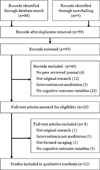The potential effects of meditation on age-related cognitive decline: a systematic review
- PMID: 24571182
- PMCID: PMC4024457
- DOI: 10.1111/nyas.12348
The potential effects of meditation on age-related cognitive decline: a systematic review
Abstract
With a rapidly aging society it becomes increasingly important to counter normal age-related decline in cognitive functioning. Growing evidence suggests that cognitive training programs may have the potential to counteract this decline. On the basis of a growing body of research that shows that meditation has positive effects on cognition in younger and middle-aged adults, meditation may be able to offset normal age-related cognitive decline or even enhance cognitive function in older adults. In this paper, we review studies investigating the effects of meditation on age-related cognitive decline. We searched the Web of Science (1900 to present), PsycINFO (1597 to present), MEDLINE (1950 to present), and CABI (1910 to present) to identify original studies investigating the effects of meditation on cognition and cognitive decline in the context of aging. Twelve studies were included in the review, six of which were randomized controlled trials. Studies involved a wide variety of meditation techniques and reported preliminary positive effects on attention, memory, executive function, processing speed, and general cognition. However, most studies had a high risk of bias and small sample sizes. Reported dropout rates were low and compliance rates high. We conclude that meditation interventions for older adults are feasible, and preliminary evidence suggests that meditation can offset age-related cognitive decline.
Keywords: aging; cognitive decline; meditation; mindfulness.
© 2013 New York Academy of Sciences.
Conflict of interest statement
The authors declare no conflicts of interest.
References
-
- United Nations. New York: United Nations; 2002. World Population Ageing, 1950–2050.
-
- Administration on Aging. Washington DC: Department of Health and Human Services Retrieved; 2012. A Profile of Older Americans Vol. June 18.
-
- Mather M, Carstensen LL. Aging and motivated cognition: the positivity effect in attention and memory. Trends Cogn. Sci. 2005;9:496–502. - PubMed
Publication types
MeSH terms
Grants and funding
LinkOut - more resources
Full Text Sources
Other Literature Sources
Medical


